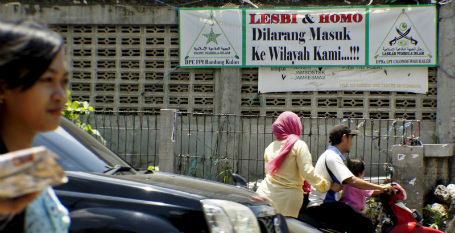A slew of moves against the rights of LGBT in the world's largest muslim country, Indonesia, have taken place over the last few weeks.
It began with a senior government minister seeking a ban on LGBT groups at university campuses. Muhammed Nasir, argued that the LGBT community should be barred from university campuses in order to uphold standards of values and morals.
In the same week, Ridwan Kamil, mayor of Bandung, called for a ban on gay content on social media. His comments sparked Islamist vigilante attacks on the community in the region.
Another prominent government minister Luhut Binsar Pandjaitan made remarks while visiting the Islamic organization Muhammadiyah, and said that Indonesia wouldn’t bow to foreign pressure regarding LGBT matter.
“We should minimize the impact of LGBT people in Indonesia through a policy,” he said, according to Antara news.Late last week, the National Commission for Child Protection said it fully supported a ban on gay-oriented content on the nation’s airwaves, according to the New York Times.
Messaging apps buckled to pressure from the government and removed LGBT stickers and emoticons from their stores. (Read our full story below).
On February 15, vice president Jusuf Kalla asked the United Nations Development Program not to finance LGBT community programs in the Indonesia—rejecting Indonesia's portion of $8 million of funding for campaigns in South East Asia.
On Wednesday, the Indonesian government announced a plan to block the social media site Tumblr in the country due to all the references to LGBT relationships. The move was in accordance with the 2008 Pornography Law, according to communications and information ministry's e-business director, Azhar Hasyim.
The website Quartz reports that the hashtag #TolakLGBT (meaning "reject LGBT") also began trending on twitter.
Human rights groups inside and outside the country are worried. “It has been one thing after another,” Dede Oetomo, a veteran gay rights activist, told the New York Times Monday. “At first, I thought it was just a storm in a teacup. But the teacup is getting bigger.”
Other groups have noted that the backlash is surprising as LGBT groups are not particularly active and visible. “They aren’t advocating for same-sex marriage, for example,” said Kyle Knight, a researcher on lesbian, gay, bisexual and transgender rights at Human Rights Watch in New York.
“What they seek is fundamental: security and freedom of assembly,” he said. “Suggesting that LGBT students don’t have the right to gather or that they need religious instruction or otherwise indicates a brittle understanding of diversity.”

